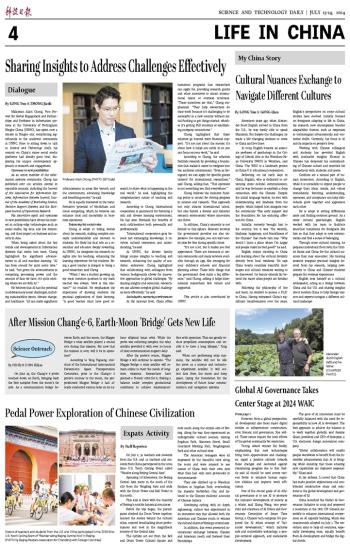
The development of AI urgently requires in-depth discussions and consensus-building among countries, as well as collaborative efforts to seize opportunities and overcome challenges, Chinese Premier Li Qiang said in his address at the opening ceremony of the 2024 World AI Conference (WAIC) and High-Level Meeting on Global AI Governance in Shanghai on July 4.
Themed "Governing Al for Good and for All," the four-day event comprised four core sections: the conference and forum, display and exhibition, contest and award, and intelligent experience.
It has built world-class cooperation and exchange platforms with top scientists, experts and scholars, entrepreneurs and government officials. They shared their insights on various topics including AI ethics and governance, large language models, data, computing power, AI agent, AI for science, and autonomous driving.
The rapid revolution of AI technology has brought enormous benefits to economic and social development as well as considerable and potential risks. As a result, global AI governance has become a common issue worldwide. It urgently requires dialogue and cooperation to build consensus, manage risks, and promote the development of AI in a direction that benefits society.
Global AI governance and international cooperation topped the agenda at the 2024 WAIC. Prominent scholars and entrepreneurs offered their viewpoints and suggestions on AI ethics and safety.
To promote the healthy development of AI and reduce risks, China is introducing laws, regulations, and guidelines in areas such as algorithms, computing power, data, and industrial application safety, according to Xue Lan, dean of Schwarzman College and dean of the Institute for AI International Governance at Tsinghua University.
However, from a global perspective, AI development also faces major digital divides in infrastructure construction, civic literacy, and governance, Xue added. These issues require the joint efforts of the global community for resolution.
Turing Award winner Raj Reddy, emphasizing that new technologies bring both opportunities and challenges, urged a positive attitude towards these changes and cautioned against abandoning progress due to fear. Reddy said AI should be used across various fields to enhance human cognitive abilities and improve work efficiency.
One of the crucial goals of AI ethical governance is to use AI to promote the inclusive development of society as a whole, said Zhang Wang, vice president and chairman of AI Ethics and Governance Committee of Sense Time Group, a Chinese tech company. He proposed the AI ethics concept of "balanced development," which includes safe and controllable technology, a people-centered approach, and sustainable development.
The pace of AI innovation must be carefully balanced with the need for responsibility in how AI is developed. The best approach to achieve the balance is to work together globally, said Sassine Ghazi, president and CEO of Synopsys, a U.S. electronic design automation company.
"Global collaboration will enable people worldwide to benefit from the incredible advancements that AI is bringing while ensuring that those amazing new capabilities are deployed responsibly," Ghazi said.
In his address, Li noted that China has made positive explorations and contributed constructive ideas and solutions to the global development and governance of AI.
China launched the Global AI Governance Initiative in 2023 and proposed a resolution at the 78th UN General Assembly to enhance international cooperation on AI capacity building, which was unanimously adopted on July 1. The resolution aims to help all countries, especially developing ones, equally benefit from AI development and bridge the digital divide.







